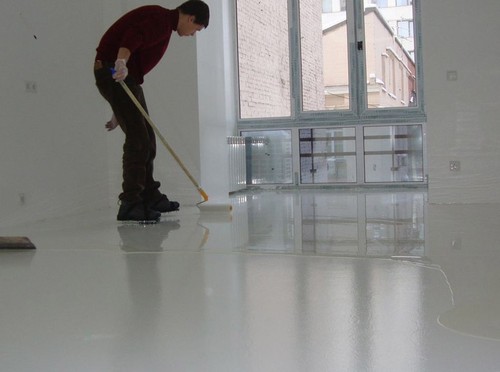
Photo: pol-master.com
Benefits
Very decorative, especially with 3D lacquer coating. Wide range of colors, from soft to rich shades. At the same time, you can apply drawings and create textured surfaces. High compressive and flexural strength. Solidity, lack of seams, ease of care increase hygiene.
Moisture resistance. Such floors are wear-resistant and shock-resistant. It can be washed with active detergents and even solvents. They do not contain toxic or allergic substances, they are dust-free, they are not susceptible to the appearance of fungi and mold. Possess fire certificates.
It is possible to do different working layer thickness. So on a concrete base layer can reach up to 10 mm, and on top of the existing self-leveling floors you can update the finishing layer of just 0.5 mm. The result is a uniform coating that does not have seams.
Epoxy resistant to mechanical stress. Polyurethane is not afraid of chemical exposure, including acids, oils and even gasoline.
Polyester maximum hygienic and eco-friendly. Acrylics are not afraid of thermal shocks and ultraviolet, quickly harden and can be mounted even at sub-zero temperatures. Various special technical characteristics such as antistatic properties, anti-slip can be set.
disadvantages
Self-leveling floors quite expensive, both from the calculation of the material per square, and at the cost of installation. Installation of a new coating can take quite a long period of time, since it is necessary to prepare a perfectly smooth base, wait until it is completely dry (it takes 28 days to reach a residual moisture content of 4-6%), and then install the polymer. Local repair also presents a certain complexity, since ideally choosing a color is quite difficult. Some species turn yellow from ultraviolet radiation, so they cannot stand the sun's rays. The coating is not natural. Remove such coverage will be very problematic.
Also disadvantages include vapor tightness such coverage. Given that the concrete is hydrophobic and vapor-permeable, but the polymer does not, an active waterproofing of the base is necessarily necessary. Otherwise, the capillaries of the concrete slab can skip vapors up to the polymer layer, where condensation will occur on the vapor-proof polymer material. Over time, the pressure of water vapor can lead to delamination, i.e. delamination of the polymer coating. At the same time, water that does not exit leads to the carbonization of concrete, which negatively affects its strength characteristics and causes destruction of the base.
There is another type of self-leveling floors with improved characteristics - polymer cement. It is based on cement, so the material remains vapor-permeable. But it also includes special polymer chemical additives, which are selected in a complex. Due to this, the system turns out to be modified, it allows you to create self-leveling floors with a thickness of 5 mm. Such floors are vapor-permeable, very durable in compression and bending, resistant to abrasion, fireproof. The system is self-leveling. Repair is quite simple. There are a lot of color solutions.
